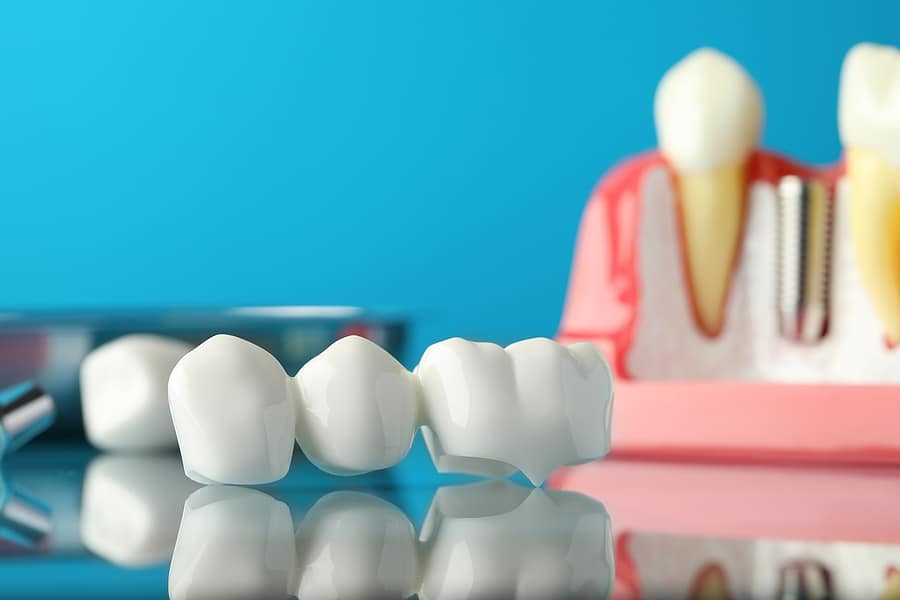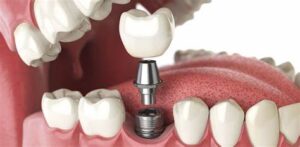Restoring your smile and dental function is not just about aesthetics; it’s about maintaining your overall well-being. Whether you’ve lost a tooth due to injury, decay, or other factors, understanding the available options is essential. With that in mind, there are two restorative options that patients usually choose between: dental implants and bridges. So, which is right for you?
Dental Implants vs. Bridges: Which is Better?
When facing the decision of how to replace a missing tooth, it’s vital to grasp the fundamental distinctions between dental implants and bridges. Let’s start by exploring the pros and cons of dental implants:
Pros and Cons of Dental Implants
Dental Implant Advantages:
- Durability: Dental implants are known for their long-lasting nature, often lasting a lifetime with proper care.
- Stability: Implants are firmly anchored in your jawbone, providing stability similar to natural teeth.
- Natural Appearance: They look and feel like real teeth, enhancing your smile’s aesthetics.
- Preservation of Jawbone: Implants stimulate the jawbone, preventing bone loss.
- Improved Chewing and Speech: They allow for better chewing and speaking abilities compared to some alternatives.
Considerations for Choosing Implants:
- Dental implants are ideal for individuals with strong jawbones and good overall oral health.
- The implantation process typically takes several months, including healing time.
Possible Drawbacks of Implants:
- Implants can be more expensive upfront compared to other options.
- Some patients may require bone grafting if their jawbone is not substantial enough to support an implant.
Pros and Cons of Dental Bridges
Dental Bridge Advantages:
- Cost-Effective: Bridges are generally more budget-friendly than dental implants.
- Faster Restoration: The process is quicker than implantation, often taking a few weeks.
- No Surgery: Unlike implants, bridges do not require surgical procedures.
- Effective for Multiple Missing Teeth: Bridges are suitable for replacing several adjacent missing teeth.
Considerations for Choosing Bridges:
- Bridges are a practical option when neighboring teeth are strong and healthy.
- They are often recommended for individuals who prefer a faster solution.
Disadvantages of Dental Bridges:
- Bridge placement may require altering adjacent teeth, which can weaken them.
- They may not offer the same level of long-term stability as implants.
Is a Dental Implant Better than a Crown or Bridge?
There are a lot of options when it comes to dental restoration. One common question patients ask is whether dental implants are better than a dental crown or bridge. Let’s look at a thorough comparison between these treatments:
Dental Implants vs. Crowns
Dental Implants vs. Crowns: When to Choose Implants:
- Complete Tooth Loss: If you’ve lost a tooth entirely, an implant can replace both the root and the visible part of the tooth, providing unparalleled stability and a natural appearance.
- Long-Term Solution: Implants offer a more durable, long-lasting solution. If you’re looking for a restoration that can stand the test of time, implants are often the go-to choice.
- Preserving Adjacent Teeth: Unlike dental crowns, which require reshaping adjacent teeth for support, implants don’t involve altering healthy teeth. This is an advantage if you want to preserve your natural teeth.
Dental Implants vs. Crowns: When Crowns Are Suitable:
- Tooth Preservation: When a tooth is damaged, but the root is healthy, a dental crown can restore its function and appearance without the need for an implant.
- Cost Considerations: Crowns are generally more cost-effective than dental implants, making them a practical choice for those on a budget.
- Faster Restoration: Crown placement is usually quicker than implantation, making it a suitable option for individuals seeking a speedier solution.
Dental Implants vs. Bridges (Revisited)
Reiterating the Key Differences:
- Dental implants are stand-alone replacements, resembling the look and function of natural teeth, whereas bridges rely on neighboring teeth for support.
- Implants are typically more durable and have a longer lifespan compared to bridges.
- The implantation process can take several months, including healing time, while bridges are usually quicker to place.
Scenarios Where Implants Excel:
- Single Tooth Replacement: For a single missing tooth, an implant often provides the best functional and aesthetic outcome. It doesn’t involve altering adjacent teeth, ensuring they remain healthy.
- Long-Term Investment: If you view your dental restoration as a long-term investment, dental implants offer the advantage of lasting many years, potentially a lifetime, with proper care.
- Preserving Jawbone: Implants stimulate the jawbone, preventing bone loss over time. This is particularly beneficial for maintaining your facial structure and overall oral health.
Bridge or Dental Implants After Tooth Extraction?
When faced with the scenario of tooth extraction, it’s essential to determine whether a dental bridge or implant is the better choice.
Immediate Implant Placement
In some cases, it’s possible to have an implant immediately after tooth extraction. This approach offers benefits like preserving bone structure and reducing the overall treatment time. However, it requires careful consideration and may not be suitable for everyone.
Delayed Implant Placement
Delayed implant placement may be necessary when the extraction site requires time to heal before an implant can be placed. This process involves allowing the jawbone to recover fully, ensuring a stable foundation for the implant. It’s a cautious approach that prioritizes long-term success.
Implant-Supported Bridges: Where Implants and Bridges Meet
When facing the challenge of multiple missing teeth, implant-supported bridges blend the stability of dental implants with the spanning capabilities of traditional bridges. By anchoring the bridge to implants surgically placed in the jawbone, this solution offers durability, improved chewing function, and the preservation of adjacent teeth, making it a versatile choice for restoring your smile.
The Importance of Consultation with Your Dentist
Before making any decisions regarding dental implants, bridges, or other treatments, a crucial step is scheduling a consultation with your dentist. This initial appointment plays a pivotal role in your dental restoration journey, as it allows you to gather essential information and make informed choices.
What Happens During a Dental Consultation?
- Assessment of Oral Health: The dentist will assess your oral health by examining your teeth, gums, and any areas of concern. They may take X-rays or use other diagnostic tools to get a comprehensive view of your dental condition.
- Discussion of Treatment Options: Based on their evaluation, the dentist will discuss suitable treatment options tailored to your specific needs. This is where you’ll receive expert guidance on whether a dental implant, bridge, or another solution is most appropriate.
- Clarification of Your Goals: Your dentist will take the time to understand your goals and priorities for dental restoration. Whether you’re focused on aesthetics, function, or a combination of both, your preferences will be considered.
- Cost Estimate and Insurance Coverage: The dentist will provide you with a cost estimate for the recommended treatment and discuss any insurance coverage or financing options available to you.
- Addressing Your Questions and Concerns: This is your opportunity to ask questions and express any concerns you may have. The dentist will provide clear, understandable answers to ensure you have a comprehensive understanding of the proposed treatment.
- Customized Treatment Plan: After your consultation, the dentist will create a customized treatment plan that outlines the recommended procedure, timeline, and any necessary preparations.
The Value of a Dental Consultation
- Informed Decision-Making
- Personalized Care
- Financial Clarity
- Peace of Mind
Contact Us Today for Your Smile Goals!
In Puyallup and Graham, WA, Advanced Emerald Dentistry is your trusted partner in maintaining your oral health and achieving your brightest smile. We are committed to delivering top-notch dental care in Pierce County, WA, and we can’t wait to welcome you to our family.
Our friendly and personalized team is here to ensure your comfort and provide you with the highest quality dental services. From routine cleanings to advanced treatments, we’ve got your dental needs covered.
Here’s How to Reach Us
Puyallup Location:
803 39th Ave SW, Suite E Puyallup, WA 98373
Phone: 253-559-1660
Graham Location:
21110 Meridian East, Suite E3 Graham, WA 98338
Phone: 253-445-1500
Experience dentistry that prioritizes your well-being, delivered with a gentle and caring touch, and absolutely no compromise on quality. Join the Advanced Emerald Dentistry family today, and let us make your smile shine brighter than ever.
Schedule Your Appointment Now! Don’t wait—contact us today to book your next dental visit and embark on a journey to a healthier, happier smile. We look forward to meeting you and serving your dental needs with dedication and excellence.




